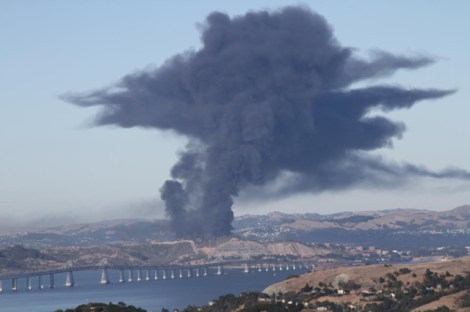Nearly six months after a Chevron refinery erupted in flames in Richmond, Cailf., there’s a tiny bit of charred justice for residents of the San Francisco East Bay area.

In an announcement Wednesday, California’s Division of Occupational Safety and Health (Cal/OSHA) said it would be fining Chevron $963,200 for the fire — the biggest fine ever levied by the agency, and the biggest fine Cal/OSHA was even legally able to levy.
Cal/OSHA enforces workplace-safety law, and this judgment stemmed directly from 25 violations the agency said Chevron had committed. From the San Francisco Chronicle:
The state said 11 of the violations were willful and that Chevron had disregarded known and obvious hazards, a category that carries a fine of $70,000 per instance. Twelve other violations were deemed serious, with fines ranging from $6,000 to $25,000 apiece. The other two violations were minor.
Cal/OSHA found that Chevron officials ignored their own reliability department’s urging in 2002 that they replace the pipe that ultimately failed. Company inspectors told managers that the line was vulnerable to corrosion.
The line had lost more than 80 percent of its thickness to corrosion when it finally ruptured, a separate federal investigation has found. …
The state also found several violations at the refinery that weren’t related to the fire, but which suggest that Chevron’s safety regimen was lax.
Among those were nine makeshift repairs of pipe leaks in which Chevron had tried to fix the problems with clamps, Cal/OSHA said. Such repairs should have been temporary, but “in some cases the clamps remained in place for years, rather than (Chevron) replacing the pipes themselves,” the agency said.
The judgment did not say whether Chevron’s own workers had actually made the situation worse by puncturing another pipe.
In a move that surprised no one, Chevron vowed to appeal the decision, specifically the “willful” characterization.
Chevron wasn’t the only passive-aggressive problem at this party. Cal/OSHA itself was criticized after the fire when it was discovered the agency had not fined a major oil company in 10 years, and had been inspecting refineries in about 50 hours each, compared to 1,000 hours spent on average by federal officials.
As for members of the general public who also suffered from Chevron’s black plumes — about 15,000 of whom sought medical attention at local hospitals — Chevron says it’s paid $10 million to area medical centers in compensation.
It’s a little bit of justice for poor, dirty Richmond, but it’s not likely to quell the unrest there. Two weeks ago, even Richmond Mayor Gayle McLaughlin joined in a demonstration at the refinery protesting Chevron’s comically large money sacks of influence over local politics. The oil giant can build all the community gardens it wants — this town will still remember the time Chevron sent their kids to the hospital with acute respiratory distress, and then tried to buy the city council.



